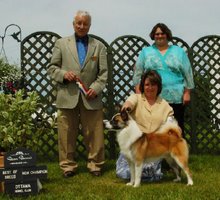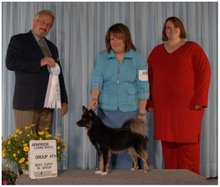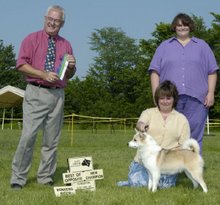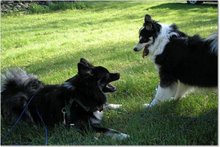I first say this wonderful page of write ups was done by Peggy D Melton, and I have used her writings as a starting place, its been modified to fit our breed and what is happening today within our different breeders.
This is purely a subjective approach to helping the newcomer understand the differences in facilities that may be encountered while searching for their next family pet, or their first show prospect There are always exceptions to every rule. Every rule except never say never or always. Let the buyer be informed. Doesn't that sound better than, "Let the buyer beware."
BACK YARD BREEDER: The BYB is disliked for many reasons. The number one reason is that they are responsible for the development of many health problems seen in common pet animals of all breeds. It gives the dedicated breeder as well as the breed in general a bad reputation. This type of person has a registered dog and thinks it would be fun, or profitable to have a litter of puppies. Perhaps they want the children to enjoy the miracle of birth first hand. Without thought to genetic problems, eye problems, hip, thyroid, skin, inherited epilepsy. The list goes on and on. They find someone else with an opposite sex of the same breed, in Icelandic, they often buy two puppies and only ever breed to those two together, litter after litter, year after year!. Obviously the only qualification necessary and they have a litter. From this hastily produced litter they then sell (if they are lucky) the puppies without imparting any knowledge on the care the little guy will need. Often because they themselves do not know. They do not explain the breed's good or bad points and when these buyers have questions and problems, they receive no help at all from the people who took their money and closed the door. Without guidance with their new charge, problems often develop and often result in owner-turn in at the local Humane Society. Abandoned or just neglected in a small dog run in the back yard, allowed to run the neighborhood, or tied to a tree. If you couldn't tell, I have little patience with this type of person.
BackYard Hobby Breeders: Now "Hobby Breeders" are wonderful, but there are a few Backyard Hobby Breeders, these are the folks that have figured out that "you" will not buy from a Backyard breeder, and they have stepped up JUST enough to give the appearance of being a hobby Breeder, they do health tests (but if you watch close, their dogs are ALWAYS PERFECT or if they do have something.. it will never bother them!), they might show once or twice a year (JUST to Say they did it), they might take a dog class or two but their dogs have no titles in any of the dog sports.
Two Big Tip Off's for this type of breeder is breeding "rare" that does not meet the standard, they have a Rare coat color, or a Rare Eye Color, or a Rare Family line or a Rare Extra Small or Extra Large examples of the breed.. the best one I ever read on the website, was a rare super large, long legged untypical color..(this dog would no more win in the show ring nor did it look like an Icelandic).. to addesss each of the rares above with an answer, here goes..
Rare colors- this means that the color is not approved by the breed standard or that its faulted in the standard and the show rings -Often the colors that are faulted by the Icelandic Standard are done so because there are related Health risks to those colors or patterns but the breeder certainly won't tell you about that part of the deal! If they even know!
Rare Eye colors- Again these would be colors not allowed or faulted in the Icelandic Breed Standard and once again, these colors were made a fault because they either took away part of what "makes" the breed type or because their can have known health side effects, but its doubtful that these Hobby Back yard Breeders know or would share with you, what those possable bad side effeect are..
They often seem to breed the "smallest or the Largest" , now I would love to tell you why they choose to do this, but the truth is the best I can figure is that they start out with inferiour breeding stock and they have the hangover from the Backyard breeder mind set of " if its got a purebred pedigree- then you need to breed it!"
The second big Tip off- Total and Complete LACK OF BREED TYPE- When you go to a good Hobby Kennel or a Good Show Kennel, in the Icelandic Sheepdog Breed you can and most likely will see both coat types (Med and Long), and many different coat colors- Cream to deep reddish brown, Chocolate, and Black Tri, in terms of Coat Pattern, you can see very little white all the way up to Peids, and all are allowed by the standard, and are part of what makes our wonderful breed.
But they should at least look like the same breed!, they should have the same general look to their heads, their body outlines, their leg lengths etc.. now each kennel or breeder might have a slightly different look then each other but what we are taking about is "Within their own kennel" the dogs should look mostly alike..
But not in a the Backyard Hobby Kennel, they will still be breeding their "Pet Qaulity" which comes in all shapes/sizes/looks dogs.. you will look at them and each dog can appear to often be a different crossbred ISD.. Even when they start keeping back dogs, you will often find that their keep back dogs will all look different, this is because the breeder has no idea what to look for and often does not care that they are producing generation after generation of pet qaulity puppies..
If you just want a pet, and you don't care if it looks like a Icelandic To the breed standard, then this is perfectly fine kennel to get a pet dog from, but I would make sure that you are only paying a much lower price for a pet quality ISD out of Pet Qaulity ISD Parents, the only thing this kennel has going for it, is that it does its health tests.
If you are looking for a Typical looking Icelandic Sheepdog pet puppy or a Show/Breeding Icelandic Sheepdog, it would do best to stay away from the Hobby-BackYard Breeders.. I regret to say that we have a number of these folks within our breed.. and I highly recommend that you keep an eye out for them and steer clear.. They are getting better in someways at hiding what they are..so you as the buyer need to become informed and make a smart choice for your home and family
HOBBY BREEDERS: The Hobby Breeder is perhaps the kind of breeder that is encountered most often on Icelandic web sites. A family that houses between three and seven dogs of either sex and has one or two litters every so often. This is a well-planned event and treated with much reverence. Their dogs are mostly kept in the house and are part of their family. They do not pursue the CKC breed ring on a weekly basis, but do go on occasion and take great pride in their wins and accomplishments in all venues of CKC/UKC competition. There is so much more than just the conformation ring. Obedience, herding, coursing, agility, therapy dogs, the list is endless. You will often find an outstanding show-prospect puppy from this type of home as they do strive to produce the best based on their knowledge. When looking for your pet, you can ask a few questions and request copies of the pedigrees and any genetic test results of the dogs being bred. It is easy to spot the difference from a Back-Yard Breeder (BYB) and a Hobby Breeder based on the answers to a few well-worded questions.
SHOW KENNEL: Another type of breeder you will see is a show kennel. A show kennel usually houses somewhere between 10 and 30 dogs at one time. This is the breeder who seriously hits the breed ring almost every weekend, hires handlers to go when they can't, and seriously advertises and campaigns their dogs to completion of numerous CKC awards. The difference here is usually the amount of knowledge and the amount of time devoted to their dogs. A show kennel breeder can quote the standard forwards and backward upon request, run down family lines at will. They can recall wins from the past and be able to equate those wins to the present as a comparison. They can discuss the current genetic problems that exist in their breed today and yesterday. They take great pride and care in the quality of the health of their breeding stock as well as in the looks. The Show Kennel Breeder as the Hobby Breeder, is deserving of your respect and your acknowledgement of their vast knowledge and willingness to help newcomers get started. This is also an excellent place to begin your search for your new puppy. Out of every litter produced for show quality, only a few of each litter will be deemed extraordinary enough to be placed in a show home, or kept as a show prospect. The others from that litter will be offered (hopefully on a spay-neuter agreement) to families that meet the qualifications of the breeder. You will get a lovely puppy that will be healthy and you can be proud to share with your friends and family. You will also get their phone number with a willing listener should difficulties arise..
PUPPY MILL: This type of establishment is the worse. At a puppy mill one can expect to find atrocious housing condition and poor nutrition of the breeding stock. Often these dogs are kept in small cages or pens and bred constantly to produce very unhealthy and unhappy puppies. These puppies are then sold wholesale to auction houses, web sites spouting several different breeds available, and pet stores where they are resold as valuable purebred CKC puppies at great costs to unsuspecting buyers. When the productive years are over, or health problem come to light, the non-productive stock is disposed of. Often inhumanely, always unfairly. This is the type of situation we hear about on the news, in many articles written in Time Magazine and other quality publications, and is the absolute bottom-of-the-barrel for ethics and kindness to our loyal companions.
PUREBRED RESCUE ORGANIZATIONS: An excellent source for a family addition. Many devoted people donate their time and money to rehome unwanted dogs with their only reward being the smile on the faces of the new families and the wagging tails as their charges finally get to go home. These dogs are usually older and have often had traumatic experiences that they may carry with them forever. A rescued dog can be a great find, but one must be careful and listen to the advice of the rescue people in regarding what to expect from this particular dog. Most all rescue people have the experience to rehab the most difficult personality problems and are willing to explain what can be expected of the new dog.
Subscribe to:
Post Comments (Atom)







No comments:
Post a Comment